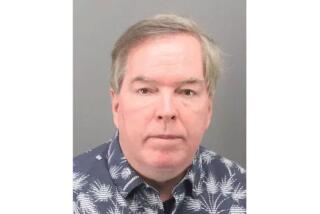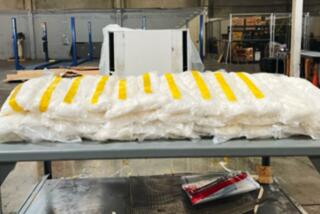Counterfeiter of CDs, Software Pleads Guilty
- Share via
A Diamond Bar man pleaded guilty Tuesday to federal charges of trafficking in more than $13 million worth of counterfeit compact discs and computer software programs.
Using state-of-the-art replication equipment, Hung Lin Wu, 36, operated two warehouses in the San Gabriel Valley where the CDs were copied by the thousands, prosecutors said.
The counterfeit discs included Microsoft’s Office 97 program and an assortment of popular musical CDs.
In a plea agreement, Wu admitted distributing more than 332,000 counterfeit musical CDs and more than 50,000 copies of Microsoft software programs.
The musical CDs, which would have had a legitimate retail value of about $16 each, sold for about $10 on the black market, while the Microsoft programs, costing $400 apiece at legitimate outlets, had an illicit street value of about $200, according to prosecutors.
“I knew that what I was doing was illegal,” Wu said in a statement accompanying the plea agreement, “but I was caught up in making money from the venture.”
He faces a maximum term of five years in prison and a $250,000 fine when he is sentenced in November by U.S. District Judge George H. King of Los Angeles.
Wu is also expected to plead guilty to pending state charges and serve a concurrent sentence.
His is the first trafficking case prosecuted since the Justice Department announced last month a beefed-up campaign against intellectual property thieves, with special emphasis on high-tech corridors in California, New York, Boston and south Florida.
The Business Software Alliance, an industry group, says 38% of all computer software programs sold worldwide last year were acquired through the black market.
The investigation of Wu began in September 1997, when sheriff’s deputies raided OSE Optical, his warehouse operation in Pomona, seizing a CD replicating machine and label-making equipment purchased in Taiwan. No charges were filed at that time.
Less than a month later, prosecutors said, Wu set up shop under another business name, Go-Go Trading, with new equipment in a warehouse half a mile away.
He operated there undetected until June 1998, when Glendora police, acting on a tip, raided the building believing that the occupants were growing marijuana indoors.
Assistant U.S. Atty. Alka Sagar said that when the police discovered what was actually going on, they notified the U.S. Customs Service, which, along with the FBI, investigates copyright and trademark violations.
In addition to the new replicating equipment, the raiders found thousands of CDs in various stages of production. A delivery truck was stopped as it was leaving with a load of 16,000 counterfeit musical CDs.
Wu has been in custody since then.
As part of the plea agreement, he agreed to forfeit 387,000 counterfeit musical and computer CDs as well as more than $1.5 million worth of equipment, including molding machines, compressors and silk screen makers and printers.
Sagar said that the counterfeit discs will be destroyed but that the replicating equipment will be auctioned off to legitimate firms.
More to Read
Sign up for Essential California
The most important California stories and recommendations in your inbox every morning.
You may occasionally receive promotional content from the Los Angeles Times.










